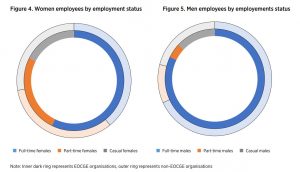Developing an ‘all-roles-flex’ philosophy will give your organisation an advantage
On 25th February 2020, the Workplace Gender Equality Agency (WGEA) released the 2020 Leaders in Gender Equality. A list of 119 Employer of Choice Gender Equality (EOCGE) citation holders.
” The EOCGE citation has been in place since 2014 and is designed to encourage, recognise and promote active commitment to achieving gender equality in Australian workplaces. The citation was reviewed and updated for the 2019-20 period to ensure that it continued to reflect best practice and remained relevant and accessible to employers.
Employers applying for the citation are required to meet a rigorous set of criteria in seven focus areas covering leadership, strategy and accountability, pay equity, support for caring, mainstreaming flexible work and prevention of harassment and discrimination”.
Congratulations to all of those organisations that are striving to excel in all areas that contribute to a more equal workforce.
Along with the EOCGE announcement, a new report by the University of Queensland was released, that demonstrates the areas in which the citation goes towards improving workplace gender equality.
“The report, commissioned by the WGEA and written by Dr Terry Fitzsimmons and a team of researchers from the AIBE Centre for Gender Equality in the Workplace, has found that EOCGE citation holders are improving on key gender equality metrics at a faster rate than other employers in the Agency’s dataset”.
Expectedly, flexible working arrangements are heralded as being a driver of inclusivity in the workplace, for women and men, and working parents in particular. In fact, leading-practice EOCGE organisations have adopted an ‘all-roles-flex’ philosophy, which we applaud.
“Flexibility policies in leading-practice organisations are characterised by a full suite of flexibility options. These organisations understand that the ability to undertake work how, when and where an employee prefers, provides a heightened degree of ability for those with caring and other life responsibilities to participate fully in the workplace”.
As a result of the variety of flexible working options available, women in EOCGE organisations are choosing more often to stay in the workforce in a full-time capacity – with 57% of women in full-time employment compared to 39% in other organisations.

These statistics clearly show that flexible working arrangements are key to the progression of women in the workplace, whereas without flexible working arrangements many women only have career limiting options available to them.
“It has been argued that many women would remain in the full-time workforce if enough flexible working arrangements were available.”
To us, this is the most important finding of this research. It not only benefits women but men who are also seeking flexibility in the workplace. As a result working parents are better off.
Read the report ‘Employer of Choice for Gender Equality Leading Practices in Strategy, Policy and Implementation’.
If you are an employer interested in discussing how flexible working may be introduced into your business or if you would like to work with us, get in contact today as our team of experienced recruiters and consultants are well placed to assist.

